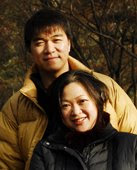There is Champagne, France; Tequila, Mexico; and Parma, Italy — all places turned trade names known for their unique, high-quality foods. Now, if China has its way, there could be another: Puer.
This lush corner of Yunnan province in China's south is home to one of the world's hottest teas. Puer tea may not look like much — it is typically sold in heaps resembling cow patties — but one mug of these aged leaves can fetch up to $1,000. The drink is touted for its health benefits and is loved for its light, earthy taste. It is already a hit in Hong Kong, where rare teas are a status symbol among the city's élite, and it is generating hype outside China, too. Three high-profile Silicon Valley techies recently tweeted and blogged their way through a Puer tea tour of Yunnan. Dieters, meanwhile, are buzzing about rumors that Victoria Beckham, the svelte former Spice Girl, drinks Puer to lose weight.
Making Puer tea as internationally renown as Roquefort cheese could expand China's tea exports while adding a bit of luster to a food industry infamous for its health scandals. But building a Puer brand will depend on getting control of a market riddled with imposters, financial speculation and controversies.
The need for stricter control of the Puer industry became clear two years ago, when the Puer market went on a destabilizing roller-coaster ride. Some Chinese buy tea as an investment, much like Europeans buy wines. In the early part of the decade, thousands of cash-rich urbanites poured their savings into the Puer, causing prices to double, then triple. "People were buying anything," says David Lee Hoffman, a California collector. By 2007, the finest aged Puer was — quite literally — worth its weight in gold. As demand soared, however, quality suffered, fakes flooded the market and prices fell.
That's when Beijing stepped in. In an effort to restore confidence, piracy-prone China tightened controls to define exactly what should be considered real Puer. As of December 2008, only teas produced in Yunnan province's 639 towns and 11 prefectures and cities can be labeled "Puer." Branded tea must also be made with a certain type of leaf, using specified technology. Yunnan leaves aged outside the province are no longer considered authentic. The goal, officials say, is to protect Yunnan's heritage and build an internationally viable, niche brand.
Not everyone welcomes the rules. It is unclear if other Chinese provinces will adhere to the regulations and grow different teas under new names. The new standards, for example, shut out tea producers in neighboring Guangdong province, who claim that the tea they process is as authentic — perhaps even more so — than Yunnan's. Guangdong tea makers contend that it was Pearl River traders, not Yunnan farmers, that originally perfected Puer. Zheng Mukun, a tea master from Guangdong, says the province's claim dates to the Qing dynasty, when tightly packed leaves were fermented over the course of the three-month journey, by horse, from Kunming to Guangzhou. The blackened leaves became popular in Hong Kong and industrious southerners began to experiment with fermentation. At the 1957 Canton Fair, Zheng says, local tea masters shared their recipes with colleagues from Yunnan. Ever since, the provinces competed to produce the best teas. Earlier this month, at a trade fair in Hong Kong, a table of Guangdong tea vendors called the regulations "unfair" and "ridiculous."
Experts also have doubts that Chinese regulators can get enough control over the Puer market to build a premier brand. Beijing's standards only apply to domestic producers; competitors in Vietnam, Sri Lanka and Burma can continue to grow and sell their own "Puer" tea. Hoffman, the collector, predicts that fakes will persist and urges caution. "This has always been a buyer-beware market, and it will always be thus," he says.
Still, Hoffman is confident the industry can thrive — and he's put money on it. This fall, he plans to open a luxury tea shop in California that will be a gathering place for American aficionados and a showcase for his fine, aged Puers. "There is a lot of hype and marketing, but that doesn't interest me," he says. "I am only interested in taste." People have offered to buy his collection, but he's dismissed them in turn. He wouldn't trade it now, he says, not for all the tea in China.




No comments:
Post a Comment